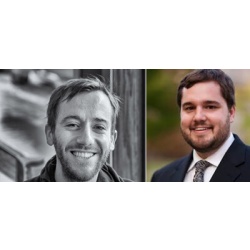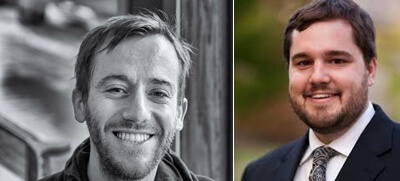
Reflections on my Luther Homecoming
(by decorahnews.com's Ben Gardner):
Over the recent Luther Homecoming, I reconnected with one of my closest friends from my four years at Luther College. My friend, John, had an obligation and couldn't make it to Decorah for Luther's Homecoming, so I drove up north and we got lunch and caught up on where our lives are now.
John recently moved back to the area—Rochester, MN—with his wife and young child and this was the first time we'd seen each other since his wedding four years ago. John and I graduated from Luther in 2012.
We're both in transitional phases. John—who studied organ performance at Luther and presently works as the musical director for a church in Rochester—recently moved with his family from South Carolina. He is excited about the open and inclusive atmosphere of his new church and he's anxious to stamp his mark on the church's worship music.
Before working at decorahnews.com, I worked as a professional baker, running Waving Grains Cooperative Bakery. There are some metaphorical similarities between bread baking and writing; nevertheless, they're very different beasts, and adjusting to this new work environment has been an ongoing and enlightening process of adaptation. I went from working alone creating bread to working with a lot of people and attempting to describe it.
I met John in Rochester at the church where he's the musical director. As I entered John's office, I was immediately taken back to the sounds, smells, and textures of college: musty dorm rooms and bad beer and the close friendships forged in confinement.
Echoing the posture he held for much of college, John was hunched over his desk as I entered his office. The walls were lined with row after row of books, bound sheet music, and CDs. On a cork board behind his desk, I could see a sheet of paper tacked to the board: I recognized my name at the bottom of the sheet and above it a quote of mine from a recent article I'd written about the new President of Luther: "When you watch a movie, she noted, you're paying attention to a lot: lighting, story, editing, color composition, acting, theme. You're holding a lot in your head at once; nevertheless, if held in harmony, a meaningful and constructive experience is born."
"That's very sweet," I said.
"I appreciated the metaphor," said John. In college, John was witness to my voracious reading and journalling, and he's happy I've found a paying gig for that creative impulse. (I remember fondly, following an evening of college adventures, John saying to me: "I expect this evening will play prominently in your memoirs.") Similar to John, I feel like this new job is a fresh start, an exciting opportunity to flex some different skill muscles.
However, opportunity is not without a shadow: self-destruction and doubt. John confided in me that a couple weeks ago, despite his exciting new job and being back in the comfort of the Midwest, he had been depressed. After a month at his new job, he was anxious to begin working on new projects and implementing his vision at the church. For reasons he doesn't completely understand, he soon became racked with doubt and uncertainty about his new job, his self-worth, and whether implementing change and reform was worth the trying effort. He confided this to me over pizza and beer at Forager Brewing Company.
"It's your self-destruct mechanism," I said. "Every time I have a clear path forward, a different path will suddenly emerge: telling me to give up, take the alternate path towards stagnation and decay. If something good comes along, you're self-destruct mechanism will kick in and tell you to stand still or take the detour towards passivity."
(I assure you, I don't always talk like this. It was the reunion, coupled with the beer, which gave me allowance to pontificate. Nevertheless, I hold by what I said, and the point resonated with John.)
John and I are both at points in our lives—we're 29—where we've approached the gates of adulthood, we've glimpsed the hidden city within, and we're still waiting on our visas to be authorized. Weddings, business reports, kids, failed relationships, health insurance, mortgages—we're getting older. Perception is changing, values are shifting, and relationships are becoming more nuanced and yet also more unclear.
What's clear to both of us—and it's something we've only realized the last couple years—is time is important and if we want to make a meaningful mark on our time here, we've got to make intentional steps forward. And this, we reasoned over the dwindling pizza slices, requires vulnerability, which is usually characterized as weakness in the Midwest.
John and I developed a strong friendship at Luther because we've always been able to talk openly and vulnerably about the gamut of personal experiences. And this conversation devoted to vulnerability and life trajectories was no different. But in contrast to our privileged lives during college, life is different now; it is more paradoxical and the stakes are higher. Life is both more draining and rewarding, more complicated and yet more simple.
I'm beginning to suspect the acceptance of contradiction in life is what we mean by wisdom. And if that's so, then John and I are becoming wise, but it's wisdom characterized more by humility than certainty.
In college, John introduced me to the music of Leonard Cohen, and in return, I introduced him to Bob Dylan. The two artists share much in common, most notably—for me—is their embrace of paradox and contradiction. For Cohen, romantic love and divine love are always inseparable; for Dylan, memory clings to the present and the past is never passed.
And for John and I, there was something paradoxical about our reunion: miles from our alma mater, years from our past selves, we were both experiencing a new kind of homecoming: a return to a new sort of meaningful friendship.
Site designed and maintained by Iroc Web Design Services©.
Your Small Business Web Design Solutions.™


